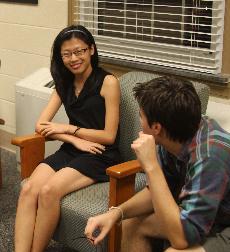The Multicultural Education Department, the Center for Principled Problem Solving, and a Guilford College senior collaborated to form a dynamic series of films and events centered on the subject of racial justice. One of the goals: to confront a subject that can make white people squirm in their seats. On Sept. 22, the series “Unmasking Whiteness: Exploring White Privilege” began with its first film, “Mirrors of Privilege.” This video shared the stories of white men and women who have taken on the challenge of confronting the subject of racial injustice and white privilege.
Dr. Shakti Butler, the executive director of World Trust Organization, directed and produced the film.
“Dr. Butler is a master at inviting people to see themselves as indelibly connected to each other and the world we live in,” according to World Trust.
Juliet Carrington, a senior majoring in community justice studies with a double minor in education and sociology, has been involved with the multicultural education department and active in anti-racism work since her first year at Guilford.
“All of us, regardless of what racial or ethnic group we are, have been deliberately mis-educated about one another, so that we continue to remain divided and/or skeptical,” said Carrington.
“As a white person, I have a greater responsibility in standing up and challenging the system of white supremacy and institutional racism within our society due to the privileges that I have in being white.”
Engaged teaching and learning specialist Judy Harvey led the discussion that took place after the film. Harvey presented the participants with questions that helped them share their experiences on the subject of white privilege.
“Well-meaning folks that are unaware need to look at the ongoing role of how they continue this destructive system,” Harvey said.
Peggy McIntosh and Tim Wise are featured in the film and have both spoken at Guilford in the past. Wise spoke in 2006 and wrote the book “White Like Me: Reflections on Race from a Privileged Son.”
“If white people don’t stand up and learn how to be allies to people of color, we definitely are going to have a very difficult time attaining a just community,” Wise said in the film.
McIntosh, an anti-racist activist and author of the essay “White Privilege: Unpacking the Invisible Knapsack,” spoke to Guilford in 2003.
“I was taught to see racism only in individual acts of meanness, not in invisible systems conferring dominance on my group,” McIntosh stated in her essay.
In her essay, she lists privileges that white people receive by simply waking up with the correct skin color.
“I have come to see white privilege as an invisible package of unearned assets which I can count on cashing in each day, but about which I was ‘meant’ to remain oblivious,” McIntosh said.
Marguerite Parks, another anti-racism activist in the film, shared an analogy of a foot race representing of the goal of racial equity.
“The goal (in the foot race) is not to take people of color and move them in front of whites,” said Parks. “The goal is to put everybody on an equal starting line.”
“Moving forward without understanding and compassion of what other people experience leads to an unjust and ineffective society,” said Chris Roe, a Guilford first-year.
The next film, “America’s Walk of Shame,” will delve into the historical groundwork of racism and white privilege in our society. The film will be shown on Nov. 17 at 8 p.m. in King 126.
“I’m active in race relations,” said first-year Jodie-Ann Geddes, who works in the Multicultural Education Department. “I thought this event was great and I plan to come to all the upcoming events.”
For more information or any questions, contact Juliet Carrington at [email protected], Jorge Zeballos at [email protected], or Judy Harvey at [email protected].

